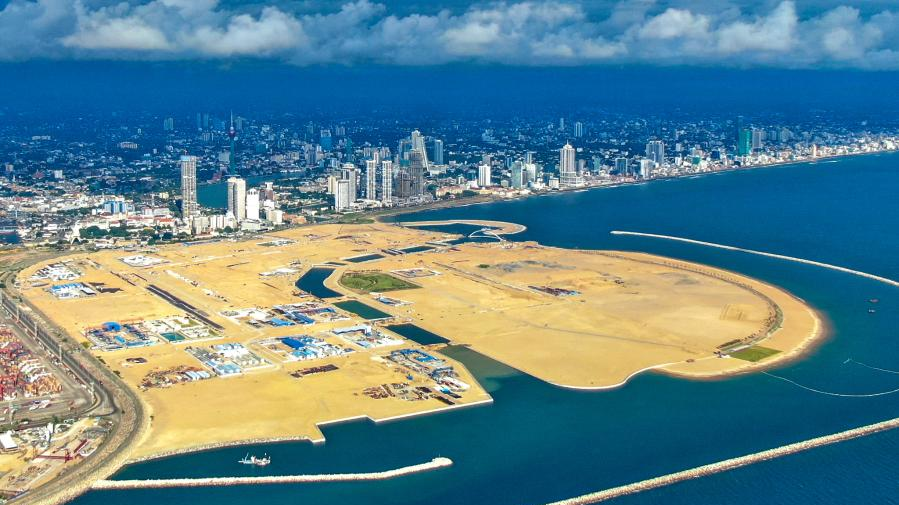
Chinese and Sri Lankan workers work at the Central Expressway Section I construction site near Colombo, Sri Lanka, October 1, 2021. [Photo/Xinhua]
By Dai Yonghong
Sri Lanka recently suffered its worst economic crisis since independence in 1948 and continued social unrest. Energy, food and medicine shortages, among other things, have led people to take to the streets in mass protests. The Sri Lankan New Year, celebrated on April 14 this year, has not provided a respite from the tense situation there. In the face of escalating conflicts, China will do its utmost to help Sri Lanka tide over the difficulties.
Internal troubles and external aggression
The COVID-19 pandemic has dealt a heavy blow to tourism, the most important industry for Sri Lanka to earn foreign exchange. Related services such as aviation, hospitality and catering have all declined, and tourism revenue has gradually dried up. Overseas labor exports are also affected. In the face of the unstable world situation, its main export products such as rubber, black tea and jewelry have become marginal products in the overseas market. A combination of these factors has led to a severe shortage of foreign exchange reserves, leading to shortages of food, fuel and medicine.

Aerial photo shows the Colombo Port City in Colombo, Sri Lanka, May 5, 2021. [Photo/Xinhua]
Meanwhile, the outbreak of the Russia-Ukraine conflict made Sri Lanka's economic crisis reach its peak. The surge in global oil prices has disrupted Sri Lanka's crude supply system. In addition, 45 percent of Sri Lanka's wheat imports come from Russia and Ukraine, and more than 50 percent of its sunflower oil, sunflower seeds and soybean imports come from Ukraine. The Russia-Ukraine conflict has pushed agricultural prices beyond the economic reach of the country's people.
Asking for help
Under the continuous impact of the pandemic and the war, Sri Lanka is scrambling to seek help from the world. The International Monetary Fund (IMF) said on April 21 that discussions with Sri Lanka on a potential loan package were at an early stage and any agreement would need "adequate assurances" that the island country's debts can be put on a sustainable path. In addition, India pledged its full support to Sri Lanka's deliberations with the IMF, including accelerating the expansion of the fund's lending. Meanwhile, India has extended a $1 billion credit line for food, medicine and other necessities to Sri Lanka. Indian Foreign Secretary Harsh Vardhan Shringla recently reiterated that Sri Lanka is a priority as a neighbor for the Modi government.
In addition, at the fourth Sri Lanka-U.S. Partnership Dialogue held in Colombo in March, the U.S. promised to provide $19 million in five-year project assistance to Sri Lanka's green energy program, but did not mention how to help Sri Lanka overcome the current economic crisis.
Overcoming difficulties together
Although separated by mountains and oceans, China and Sri Lanka communicate with each other all the time. The ancient Maritime Silk Road and its location in the Indian Ocean made Sri Lanka a crucial junction between major Asian civilizations. At present, the steady implementation of the Belt and Road Initiative has brought about closer exchanges between China and Sri Lanka.
On April 19, Xu Wei, a spokesperson for the China International Development Cooperation Agency, said that China has noted Sri Lanka's economic difficulties. As a traditional friendly neighbor, China is going to provide emergency humanitarian assistance to Sri Lanka to help it cope with the current difficulties. Humanitarian aid should not be misinterpreted by some Western countries, and the hype of a "debt trap" will not damage the friendship between Sri Lanka and China.
Despite the current economic crisis in Sri Lanka, according to the World Bank, revenue generated by telecommunications and financial services increased by 32 percent and 28 percent during the pandemic. Meanwhile, the throughput of the Hambantota International Ports Group, a joint venture between China and Sri Lanka, released a briefing document on July 13, 2021. Despite the impact of COVID-19, cargo volume at Hambantota Port maintained a substantial growth of over 180 percent year on year in the first half of 2021, indicating that the development of the port is on the fast track.
Mutual benefit and win-win cooperation to tide over difficulties is the enduring vision of China-Sri Lanka exchanges.
Dai Yonghong is the dean of School of Foreign Languages and director of Institute of Area and International Communication Studies at Shenzhen University.

 中文
中文



